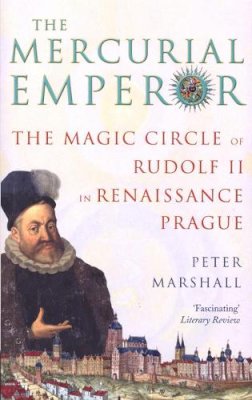
The Mercurial Emperor
Peter Marshall
In the late 16th century the greatest philosophers, alchemists, astronomers, painters, and mathematicians of the day flocked to Prague to work under the patronage of the Holy Roman Emperor Rudolf II, an emperor more interested in the great minds of his times than in the exercise of his immense power. Rarely leaving Prague Castle, he gathered around him a galaxy of famous figures: among them the painter Arcimboldo, the astronomer Tycho Brahe, the mathematician Johannes Kepler, the philosopher Giordano Bruno and the magus John Dee.
Fascinated by the new Renaissance learning, Rudolf found it nearly impossible to make decisions of state. Like Faust, he was prepared to risk all in the pursuit of magical knowledge and the Philosopher's Stone which would turn base metals into gold and prolong life indefinitely. But he also faced threats: religious discord, the Ottoman Empire, his own deepening melancholy and an ambitious younger brother. As a result he lost his empire and nearly his sanity. But he enabled Prague to enjoy a golden age of peace and creativity before Europe was engulfed in the Thirty Years' War.
Filled with angels and devils, high art and low cunning, talismans and stars, The Mercurial Emperor offers a captivating perspective on a pivotal moment in the history of Western civilisation.
Product Details
About Peter Marshall
Reviews for The Mercurial Emperor
Alex Butterworth
Observer
A sympathetic biography of this strange, intelligent aesthete-philosopher... a tragic as well as a fascinating figure
Alan Massie
Literary Review
In this sparkling history, Peter Marshall assembles a cast of characters from the medieval world, their wit and wisdom an arresting case for the significance of their time...[a] generous and attentive recollection of voices too often silenced
Rowland Manthorpe
Observer
Peter Marshall's excellent biography portrays the Holy Roman Emperor Rudolf II as a pivotal figure in the transition from the medieval worldview to our modern scientific outlook... Marshall succeeds brilliantly in capturing both the spirit of the age in which Rudolf lived and the complex character of the man he describes as "one of the last magi"
P.D. Smith
Guardian
You could do a lot worse than to pack this book in your suitcase when you're visiting the city. His lucid prose and clear exposition will help you to decipher a good bit of Prague's labyrinth, and to explain in part why the capital of one of the less important European countries is one of the great cities of the world
Justin Quinn
Irish Times
